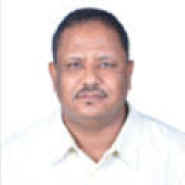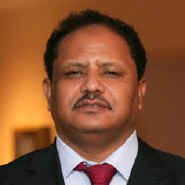 |
 |
Lookalikes: Abozer Mohamed of Maarij (left) and Abozer Elmana Elligai of GNRD (right)
Following the revelation that it is at the centre of a $13 million money-laundering investigation by Norwegian police, the Global Network for Rights and Development (GNRD) has been eager to create the impression that human rights activists around the world are rallying to its support. A headline on GNRD's website, for example, proclaims that "the non-governmental organisations community" is "shocked by the unexpected behavior of the Norwegian government towards GNRD".
This claim might be a little more credible if the organisations expressing their "shock" were not so closely connected with GNRD. Two of its most vociferous supporters are the Swiss-based International Institute for Peace Justice and Human Rights (IIPJHR) and Maat for Peace Development and Human Rights (an Egyptian organisation which appears to support the Sisi regime). IIPJR and Maat worked jointly with GNRD as observers for the presidential election in Egypt last year and are scheduled to do so again when parliamentary elections are held.
The relationship between GNRD and IIPJHR is especially close. A look at the press releases on IIPJHR's website shows most of its activities are carried out in conjunction with GNRD. IIPJHR's office address in Geneva is 1 Rue Richard Wagner, which – by a remarkable coincidence – is also the address of GNRD's Geneva office.
Sudanese connections
Another leading supporter of GNRD is Maarij Foundation for Peace and Development, a Sudanese organisation.
Speaking in the UN Human Rights Council last month, a representative from Maarij denounced the police raids on GNRD's headquarters and the home of its founder-president, Loai Deeb. "Such actions against a human rights organisation can be expected in a country with a totalitarian regime, but not in a country with a strong democracy," he said, adding that "GNRD activities are always met with high appreciation around the globe".
Maarij and GNRD have previously held joint events on the subject of Sudan. Last September, for example, at a meeting on the sidelines of the Human Rights Council, they jointly called for the United States to end its sanctions against Sudan.
Maarij has previously shown sympathy for the Sudanese government, and the Sudanese government has also shown sympathy for GNRD.
In 2011, when Sudan came up for scrutiny under the Human Rights Council's "universal periodic review" system, Maarij submitted a largely uncritical report praising "reforms" by the Sudanese government.
Last February, when the UN decided to grant GNRD consultative status (under controversial circumstances), the Sudanese government's representative spoke strongly in GNRD's support. According to an official account of the meeting (page 21):
"The representative of the Sudan recalled that the organisation [GNRD] had been under review since 2011 and highlighted the excellent work of the organisation, adding that it was registered in Norway, Switzerland and Belgium and had cooperated fully with local authorities."
An intriguing sidelight on Maarij and GNRD is that both have Emirati connections. GNRD appears to receive most of its funding via the UAE, though it denies the money comes from government sources. Deeb, its founder-president, has family and business connections there, too. The extent of Maarij's Emirati connections is unclear but it is on record (in Arabic) as having received support from a charity run by Sheikh Mohammed bin Rashid Al Maktoum, the ruler of Dubai.
But there's another, much more intimate, connection between Maarij and GNRD – and one which neither organisation seems eager to draw attention to.
Double identity
On bayt.com, a professional networking website popular with Arabs, there's a profile in the name of Abozer Mohamed, and it describes him as the Humanitarian Affairs Director of Maarij. The accompanying photograph of Abozer Mohamed bears a strong resemblance to Abozer Elmana Elligai, vice-president of GNRD.
In fact, Abozer Mohamed of Maarij and Abozer Elmana Elligai of GNRD are the same person under two different names. His full name, as indicated by another website, appears to be Abozer Elmana Mohamed Elligai.
However, there was no mention of Maarij (or, indeed, Sudan) in the biographical note about GNRD's vice-president posted on GNRD's website. It simply said:
Mr. Abozer Elmana Elligai
GNRD Vice-PresidentMore than 20 years of experience in NGOs work and cooperation with United Nations. Main GNRD representative at UN Offices in New York and Vienna; at Human Rights Council Sessions in Geneva. Consultant at AUC in Human Rights Field.
This biographical note was deleted, along with those of other GNRD staff, shortly after Norwegian media began taking an interest in the organisation's affairs but is preserved in the Wayback Machine's archive.
Posted by Brian Whitaker
Saturday, 18 July 2015

 RSS Feed
RSS Feed

